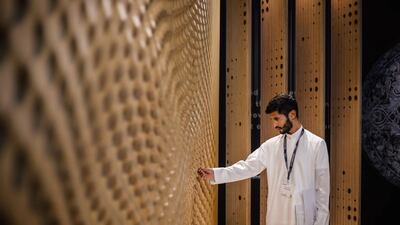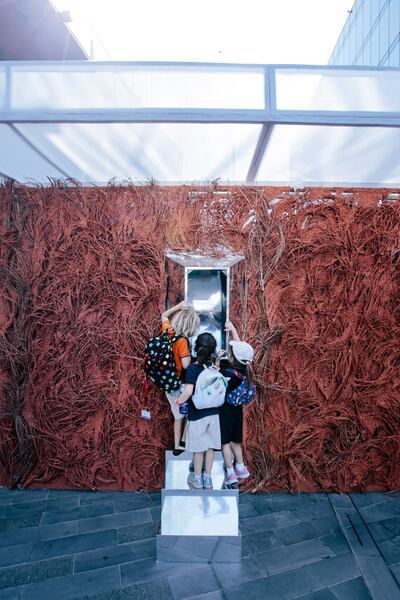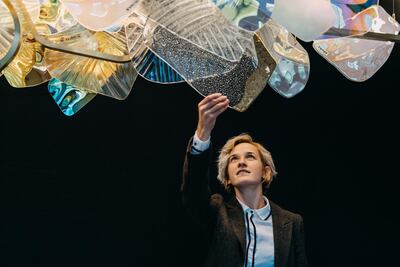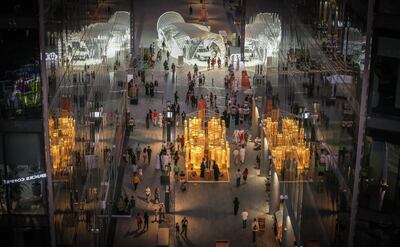Dubai Design Week is one of the UAE’s go-to events for eye-catching, inventive, and at times opulent creations. It covers both architecture and design.
But, in 2020, amid the pandemic and a weakened economy, the annual festival will take a different approach.
For its sixth instalment, which is scheduled to take place from November 9 to 14, Dubai Design Week will be more orientated towards local talent and will imbue a thematic approach that places sustainable and purposeful design at its centre.
As Dubai Design Week describes it, 2020 will be all about “responsible design geared towards positive impact”.
"I was very interested in trying to focus more on design that is responsible and purposeful, rather than more aesthetically focused or luxury or the collectible types of design," explains Ghassan Salameh, creative director at Dubai Design Week.
“This has always been an important aspect of design for me. Our job as creatives is to provide solutions for the different problems the world is going through. We have to be relevant. We cannot sit on the side and keep doing things like we always do.”
One of the biggest changes to this year’s programme is that it will be developed, for the most part, via open call.
The Abwab pavilion, a highlight of the event that features commissioned architectural models, will now be drawn from submissions by creatives in the Mena region.
Participants are asked to propose concepts for architectural structures that tackle issues such as shelters for extreme weather conditions and spaces that consider physical distancing guidelines as a way to stem the spread of Covid-19. The structures must also be semi-permanent and multipurpose in order for them to be functional beyond the event.
One question it will tackle: how can we now share public space?
“We want to investigate the relationship between city dwellers and public space and ask questions about how we can share public space,” says Salameh. “We’re trying to get more purposeful rather than aesthetic installations that could be replicated in the future on a larger sale or be adopted by the public or private sector.”
For Abwab 2020, Dubai Design Week has tied up with Sharjah environmental company Bee’ah, which will provide designers with recycled and up-cycled materials, including rubber, aluminum cans, cardboard and plastic bottles, to create their works. Preference will be given to proposals that incorporate Bee’ah’s materials in their design.
Abwab’s winning proposal will receive $40,000 (Dh146,000) for production as well as $10,000 for design fees.
The event’s outdoor installations will also be chosen through an open call. The criteria for selection of these is similar to that of Abwab’s – modular, functional and sustainable pieces that address issues around public health and safety and the environment.
Exhibition dedicated to designers residing in the UAE
For the first time, the programme will feature an exhibition dedicated to designers residing and working in the UAE. It will also include displays from the businesses housed in Dubai Design District (D3), where the event takes place.
Mette Degn-Christensen, Dubai Design Week’s director, says this way of “looking inwards” puts the local creative community in the spotlight. “We see ourselves as being able to represent our community in D3, Dubai and the UAE. We always urge international brands and manufacturers to collaborate with a regional component so we can stay relevant to our regional audience,” she says.
She adds that the pandemic has “challenged everyone to do everything in the most efficient way”, not only in terms of sustainability, but also in harnessing existing digital technologies to run activities.
One example is the “hybrid format” of this year’s talks and workshops programme, which will limit the number of onsite visitors and conduct the rest of the talks virtually.
Even in this aspect, the event organisers want to keep the talks programme efficient, functional and practical. It will revolve around the question: "Resist change, adapt to it or re-invent existing models?"
“Usually we have a conference programme with very diverse subjects. This year, the idea is to offer practical tools for the creative community on how to navigate the difficulties that the Covid crisis has created, to offer the right tools for designers to understand how to manage their business better, rather than just talking about broad, conceptual ideas,” Salameh explains.
With four months to go before the event, the team at Dubai Design Week know that things may change swiftly, as they have since the virus outbreak.
“We’re taking a risk, in a way, but we feel it’s important not to skip the year, if it’s possible. It’s a financially challenging year for everyone, especially for smaller designers and architects, and for those who are starting out under these circumstances,” Salameh says.
Degn-Christensen acknowledges the uncertainty, but says the outdoor setting of the event will also help maintain physical distancing measures.
She adds that though the footfall may drop from last year's 90,000 visitors, it is "crucial for us to continue". She says, "Growing doesn't have to mean bigger. It just means finding new ways of working and planning new initiatives."
Salameh adds: “It was very clear that our role as Dubai Design Week should be about giving back or supporting the community as much as possible, because they’re really struggling.”
“The idea is to preserve continuity for the community and give them the opportunity to exhibit their work.”
More information is available at dubaidesignweek.ae





